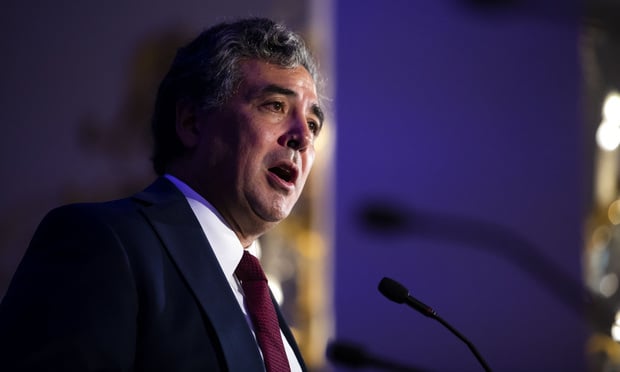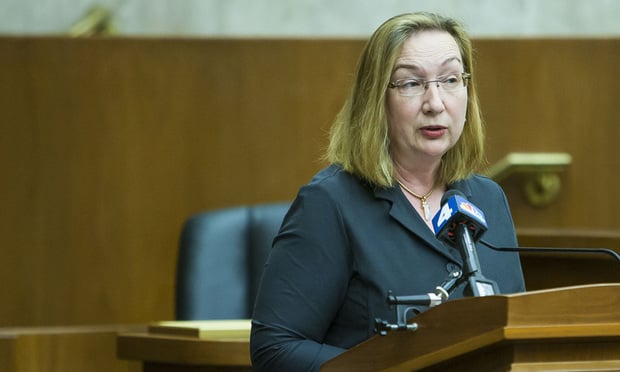US Solicitor Urges Supreme Court to Spurn Grand Jury Secrecy Challenge
The government argues the justices should defer to Congress or to the judiciary's policy-making arm to determine whether and when trial judges have any power to compel the public release of grand jury records.
November 26, 2019 at 01:47 PM
5 minute read
The original version of this story was published on National Law Journal
 U.S. Solicitor General Noel Francisco. Photo: Diego M. Radzinschi/NLJ
U.S. Solicitor General Noel Francisco. Photo: Diego M. Radzinschi/NLJ
The Trump administration's Justice Department wants the U.S. Supreme Court to turn away a researcher's claim that federal courts have inherent authority to disclose secret grand jury records, a contention that looms more broadly as House Democrats fight to obtain grand jury evidence from the special counsel investigation.
The Justice Department is opposing Stuart McKeever's petition that challenges a decision by a divided panel of the U.S. Court of Appeals for the D.C. Circuit. The appellate court ruled in April that district courts do not have inherent power to order the disclosure of grand jury materials.
McKeever, represented by Latham & Watkins partner Roman Martinez, has asked the justices to decide "whether district courts have inherent authority to release grand jury materials in extraordinary circumstances, such as when the case is historically significant and the public interest strongly favors disclosure."
The government argued in its new brief at the Supreme Court that the justices should defer to Congress or to the judiciary's policy-making arm to determine whether and when trial judges have any power to compel the public release of grand jury records. "Rulemaking would be a better forum than judicial review to address the policy judgments involved in deciding whether and when grand jury secrecy should expire, including for historically significant records," Noel Francisco, the U.S. solicitor, wrote.
McKeever has been seeking copies of certain grand jury materials from the more than 60-year-old criminal prosecution of a former FBI agent believed to have been involved in the vanishing of Columbia University professor Jesus de Galindez from New York City in 1956. Separately, the U.S. Court of Appeals for the Eleventh Circuit is weighing a challenge there about access to decades-old grand jury records in a case that involved the lynching of two African American couples in Georgia.
The grand jury cases in the Supreme Court and Eleventh Circuit are unfolding as House Democrats prepare to argue in the D.C. Circuit that a Washington judge had authority to order the release of materials prepared by Robert Mueller III, the special counsel appointed to investigate Russia's interference in the 2016 election.
U.S. District Judge Beryl Howell of the District of Columbia on Oct. 25 rejected the Justice Department's argument that the rules controlling grand jury secrecy did not permit any disclosure of Mueller's materials as part of the House impeachment inquiry. The D.C. Circuit, which earlier paused enforcement of Howell's ruling, has scheduled arguments Jan. 3 on the government's appeal.
Citing the D.C. Circuit's McKeever decision, Howell turned down the House Judiciary Committee's argument that it had inherent authority to release the Mueller grand jury materials and that "complete and absolute deference" was due to the House.
 Chief Judge Beryl Howell of the U.S. District Court for the District of Columbia during the court's Reentry Court Inauguration Ceremony. June 6, 2016. Photo: Diego M. Radzinschi/NLJ
Chief Judge Beryl Howell of the U.S. District Court for the District of Columbia during the court's Reentry Court Inauguration Ceremony. June 6, 2016. Photo: Diego M. Radzinschi/NLJDouglas Letter, the House general counsel, has acknowledged that the original D.C. Circuit ruling in the McKeever case foreclosed the argument that trial judges have inherent authority to publicly release grand jury records. Letter, however, said in a court filing that if McKeever were subject to further review, the House "respectfully preserves" that argument.
McKeever's reading of the federal rule, according to the D.C. Circuit, "would allow the district court to create such new exceptions as it thinks make good public policy." Such ability, the appeals court said, would "impermissibly enable the court to 'circumvent' or 'disregard' a Federal Rule of Criminal Procedure."
The D.C. Circuit decision created a conflict with several other circuit courts, Francisco told the justices, but the judiciary's criminal-rules committee, and not the courts themselves, are better able to address the tension. The committee, Francisco said, could "provide clear standards for disclosure of historically significant grand jury records."
Francisco noted that the Obama-era Justice Department in 2011 proposed changes to the rules committee that would permit trial judges to release, on their own, historically significant grand jury records. The committee declined to act on the government's proposal.
Martinez of Latham & Watkins said the rules committee chose not to act on the proposals because it believed district courts already had that authority.
"There is an active circuit split right now," said Martinez, who intends to file a brief replying to Francisco's arguments. "The court regularly grants cert in cases involving interpretation of federal rules. Nothing would be gained by allowing the circuit split to fester."
The Constitutional Accountability Center, represented by the chief counsel Brianne Gorod, has filed an amicus brief supporting McKeever in the Supreme Court.
"The grand jury is a centuries-old institution, and while there is a long tradition of maintaining the secrecy of grand jury deliberations, that practice has never been absolute," Gorod told the justices. "To the contrary, there is a long history of grand jury materials being disclosed where courts concluded that the interests of justice required it."
Read more:
In Grand Jury Fight, House Asserts Trump May Have Lied to Mueller
DC Circuit Will Weigh Release of Mueller Grand Jury Materials
Justices Could Decide If Judges Have Power to Release Grand Jury Records
Judges Have No Inherent Power to Disclose Grand Jury Records: DC Circuit
This content has been archived. It is available through our partners, LexisNexis® and Bloomberg Law.
To view this content, please continue to their sites.
Not a Lexis Subscriber?
Subscribe Now
Not a Bloomberg Law Subscriber?
Subscribe Now
NOT FOR REPRINT
© 2025 ALM Global, LLC, All Rights Reserved. Request academic re-use from www.copyright.com. All other uses, submit a request to [email protected]. For more information visit Asset & Logo Licensing.
You Might Like
View All
'Better of the Split': District Judge Weighs Circuit Divide in Considering Who Pays Decades-Old Medical Bill

Trump Administration Faces Legal Challenge Over EO Impacting Federal Workers
3 minute read
Greenberg Traurig Combines Digital Infrastructure and Real Estate Groups, Anticipating Uptick in Demand
4 minute readTrending Stories
- 1A Judge Is Raising Questions About Docket Rotation
- 2Eleven Attorneys General Say No to 'Unconstitutional' Hijacking of State, Local Law Enforcement
- 3Optimizing Legal Services: The Shift Toward Digital Document Centers
- 4Charlie Javice Fraud Trial Delayed as Judge Denies Motion to Sever
- 5Holland & Knight Hires Former Davis Wright Tremaine Managing Partner in Seattle
Who Got The Work
J. Brugh Lower of Gibbons has entered an appearance for industrial equipment supplier Devco Corporation in a pending trademark infringement lawsuit. The suit, accusing the defendant of selling knock-off Graco products, was filed Dec. 18 in New Jersey District Court by Rivkin Radler on behalf of Graco Inc. and Graco Minnesota. The case, assigned to U.S. District Judge Zahid N. Quraishi, is 3:24-cv-11294, Graco Inc. et al v. Devco Corporation.
Who Got The Work
Rebecca Maller-Stein and Kent A. Yalowitz of Arnold & Porter Kaye Scholer have entered their appearances for Hanaco Venture Capital and its executives, Lior Prosor and David Frankel, in a pending securities lawsuit. The action, filed on Dec. 24 in New York Southern District Court by Zell, Aron & Co. on behalf of Goldeneye Advisors, accuses the defendants of negligently and fraudulently managing the plaintiff's $1 million investment. The case, assigned to U.S. District Judge Vernon S. Broderick, is 1:24-cv-09918, Goldeneye Advisors, LLC v. Hanaco Venture Capital, Ltd. et al.
Who Got The Work
Attorneys from A&O Shearman has stepped in as defense counsel for Toronto-Dominion Bank and other defendants in a pending securities class action. The suit, filed Dec. 11 in New York Southern District Court by Bleichmar Fonti & Auld, accuses the defendants of concealing the bank's 'pervasive' deficiencies in regards to its compliance with the Bank Secrecy Act and the quality of its anti-money laundering controls. The case, assigned to U.S. District Judge Arun Subramanian, is 1:24-cv-09445, Gonzalez v. The Toronto-Dominion Bank et al.
Who Got The Work
Crown Castle International, a Pennsylvania company providing shared communications infrastructure, has turned to Luke D. Wolf of Gordon Rees Scully Mansukhani to fend off a pending breach-of-contract lawsuit. The court action, filed Nov. 25 in Michigan Eastern District Court by Hooper Hathaway PC on behalf of The Town Residences LLC, accuses Crown Castle of failing to transfer approximately $30,000 in utility payments from T-Mobile in breach of a roof-top lease and assignment agreement. The case, assigned to U.S. District Judge Susan K. Declercq, is 2:24-cv-13131, The Town Residences LLC v. T-Mobile US, Inc. et al.
Who Got The Work
Wilfred P. Coronato and Daniel M. Schwartz of McCarter & English have stepped in as defense counsel to Electrolux Home Products Inc. in a pending product liability lawsuit. The court action, filed Nov. 26 in New York Eastern District Court by Poulos Lopiccolo PC and Nagel Rice LLP on behalf of David Stern, alleges that the defendant's refrigerators’ drawers and shelving repeatedly break and fall apart within months after purchase. The case, assigned to U.S. District Judge Joan M. Azrack, is 2:24-cv-08204, Stern v. Electrolux Home Products, Inc.
Featured Firms
Law Offices of Gary Martin Hays & Associates, P.C.
(470) 294-1674
Law Offices of Mark E. Salomone
(857) 444-6468
Smith & Hassler
(713) 739-1250









